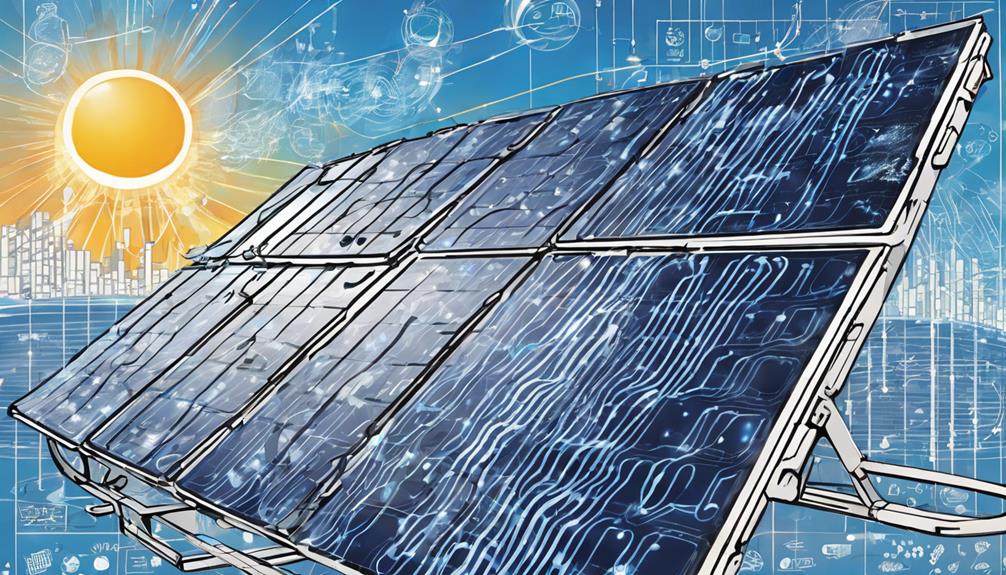I maximize solar power performance by leveraging real-time monitoring benefits. This approach allows me to identify and resolve performance issues promptly, maximizing energy output and minimizing efficiency losses. With real-time monitoring, I can detect deviations from peak performance, track key indicators, and optimize maintenance activities. By staying on top of my solar power system's performance, I can make data-driven decisions to boost efficiency and reduce energy losses. Want to know more about how real-time monitoring can supercharge your solar power performance?
Key Takeaways
- Real-time monitoring enables prompt identification and resolution of performance issues, maximizing energy output and optimizing efficiency.
- Continuous tracking of key indicators like electricity generation and maintenance helps detect deviations from peak performance.
- Real-time monitoring allows for swift detection and resolution of potential issues, reducing downtime and energy losses.
- Inverter performance evaluation and degradation rate monitoring ensure optimal energy conversion and minimize losses.
- Real-time data analysis enables data-driven decision-making, driving performance improvements and increasing overall solar power efficiency.
Real-time Monitoring Advantages

By leveraging real-time monitoring, I can instantly identify performance issues with my solar panels, enabling me to take prompt corrective action and maximize energy output.
This real-time insight allows me to detect even slight deviations from peak performance, making sure that my system operates at its best.
I can track key indicators such as electricity generation, maintenance, and degradation rates, giving me a thorough understanding of my solar panel's performance.
With real-time monitoring, I can resolve issues promptly, reducing downtime and optimizing my system's overall efficiency.
This proactive approach ensures that I'm always generating the maximum amount of clean energy possible, making a significant impact on the environment.
Performance Evaluation Metrics

To guarantee my solar panel system is running at its best, I track a set of key performance metrics that provide a detailed picture of its efficiency and productivity. These metrics include:
- Electricity generation
- Maintenance
- Degradation rates
- Inverter performance
By monitoring these indicators, I can identify potential issues and take prompt action to resolve them. For instance, if I notice a drop in electricity generation, I can inspect the panels for dirt or debris accumulation and clean them accordingly.
Regular evaluation of these metrics enables me to optimize my system's performance, ensuring I'm generating the maximum amount of clean energy possible. This data-driven approach helps me make informed decisions and get the most out of my solar investment.
Solar Energy Efficiency Gains

I've seen significant gains in solar energy efficiency over the years, thanks to advancements in technology that have improved the conversion rate of sunlight into electricity. These efficiency gains have made solar power a more viable option for clean energy generation.
With the ability to convert sunlight directly into electricity, solar panels minimize energy losses during transportation, making them a reliable and sustainable resource.
As technology continues to evolve, I'm excited to see even greater improvements in efficiency, further reducing our reliance on fossil fuels and mitigating climate change. By harnessing the full potential of solar energy, we can create a cleaner, more sustainable future for generations to come.
Educational Opportunities Abound

Solar-powered learning experiences are sparking a new wave of educational innovation, empowering students to harness the power of renewable energy and develop a deeper understanding of sustainable practices.
As I've seen firsthand, integrating solar energy into the curriculum boosts student engagement and fosters critical thinking skills. Hands-on activities, like building solar-powered devices, demonstrate the potential of solar energy and raise environmental awareness.
Raising Renewable Energy Awareness

As I reflect on the impact of solar-powered learning experiences, I realize that raising awareness about renewable energy is essential to inspiring a broader audience to adopt sustainable practices. By promoting renewable energy awareness, we can empower individuals to make informed choices about their energy consumption and contribute to a more sustainable future.
| Renewable Energy Benefits | Conventional Energy Drawbacks |
|---|---|
| Zero Emissions | Air Pollution |
| Sustainable Resource | Finite Resource |
| Low Maintenance | High Maintenance |
| Energy Independence | Energy Dependence |
Community Outreach Initiatives

Through collaborative partnerships with local organizations and community groups, we're launching targeted outreach initiatives to educate residents about the benefits of solar power and promote widespread adoption. By engaging with communities, we're empowering individuals to make informed decisions about their energy choices.
Our outreach programs include workshops, seminars, and social media campaigns, all designed to raise awareness about the environmental and economic advantages of solar energy. We're also partnering with local schools to integrate solar energy education into their curriculum, inspiring the next generation of sustainability leaders.
Sustainable Future Strategies

TEXT:
Financial planning is an essential aspect of personal finance. It involves setting goals, creating a budget, and managing money wisely. Saving for retirement, creating an emergency fund, and investing for the future are key components of financial planning. By developing a solid financial plan, individuals can achieve their short-term and long-term financial goals. Planning for unexpected expenses and preparing for major life events are also important aspects of financial planning. It is crucial to regularly review and adjust financial plans as circumstances change. Seeking professional advice can help individuals make informed decisions and navigate complex financial situations.
Understanding the basics of financial planning is crucial for building a secure financial future. By taking proactive steps and following a well-thought-out financial plan, individuals can better manage their finances and work towards financial stability. Financial planning is an ongoing process that requires discipline and commitment. Educating oneself about various financial tools and strategies can empower individuals to make sound financial decisions. Monitoring progress towards financial goals and making necessary adjustments are integral parts of effective financial planning. Ultimately, financial planning is about creating a roadmap for financial success and ensuring a stable financial future.
Frequently Asked Questions
How Often Should Solar Panels Be Cleaned for Optimal Performance?
Honestly, I clean my solar panels every 6-12 months, depending on the environment. In dusty or polluted areas, I do it quarterly to maximize energy output and prevent efficiency losses.
Can Solar Panels Generate Electricity During Power Outages?
"I'm often asked if solar panels can generate electricity during power outages. The answer is yes, but only if you have a battery storage system or a grid-tie inverter with backup capability."
What Is the Average Lifespan of a Residential Solar Panel System?
"I'm impressed that solar panels can last up to 40 years or more, with some lasting even longer If properly maintained, residential solar panel systems can provide decades of clean energy, making them a worthwhile investment."
Do Solar Panels Work Efficiently in Shaded Areas?
Honestly, I've noticed that solar panels don't work effectively in shaded areas since they rely on direct sunlight to generate electricity. Shading can diminish their energy output, making them less effective.
Are Solar Panels Resistant to Extreme Weather Conditions?
"As I bask in the warmth of solar energy, I wonder, can solar panels brave the fury of extreme weather? Thankfully, they're designed to withstand harsh conditions, from scorching heat to torrential rains, ensuring a steady power supply."
How Does Real-time Monitoring Benefit Solar Power Performance?
Real-time monitoring provides valuable insights into the performance of solar power systems, enhancing the business advantages of solar power. It allows for immediate detection and resolution of any issues, optimizing energy production and minimizing downtime. This proactive approach ultimately leads to improved efficiency and cost savings for solar power businesses.
Conclusion
As I reflect on the transformative power of real-time monitoring in solar energy production, I'm left wondering: what's impeding us from widespread acceptance?
With its capacity to optimize performance, decrease waste, and inform data-driven decisions, it's evident that real-time monitoring is the key to accessing solar energy's full potential.
By embracing this technology, we can expedite our shift to a sustainable future and create a better world for generations to come.










